Andrei Terekhov: “You can say as much as you like that American is better, but our car never breaks down”
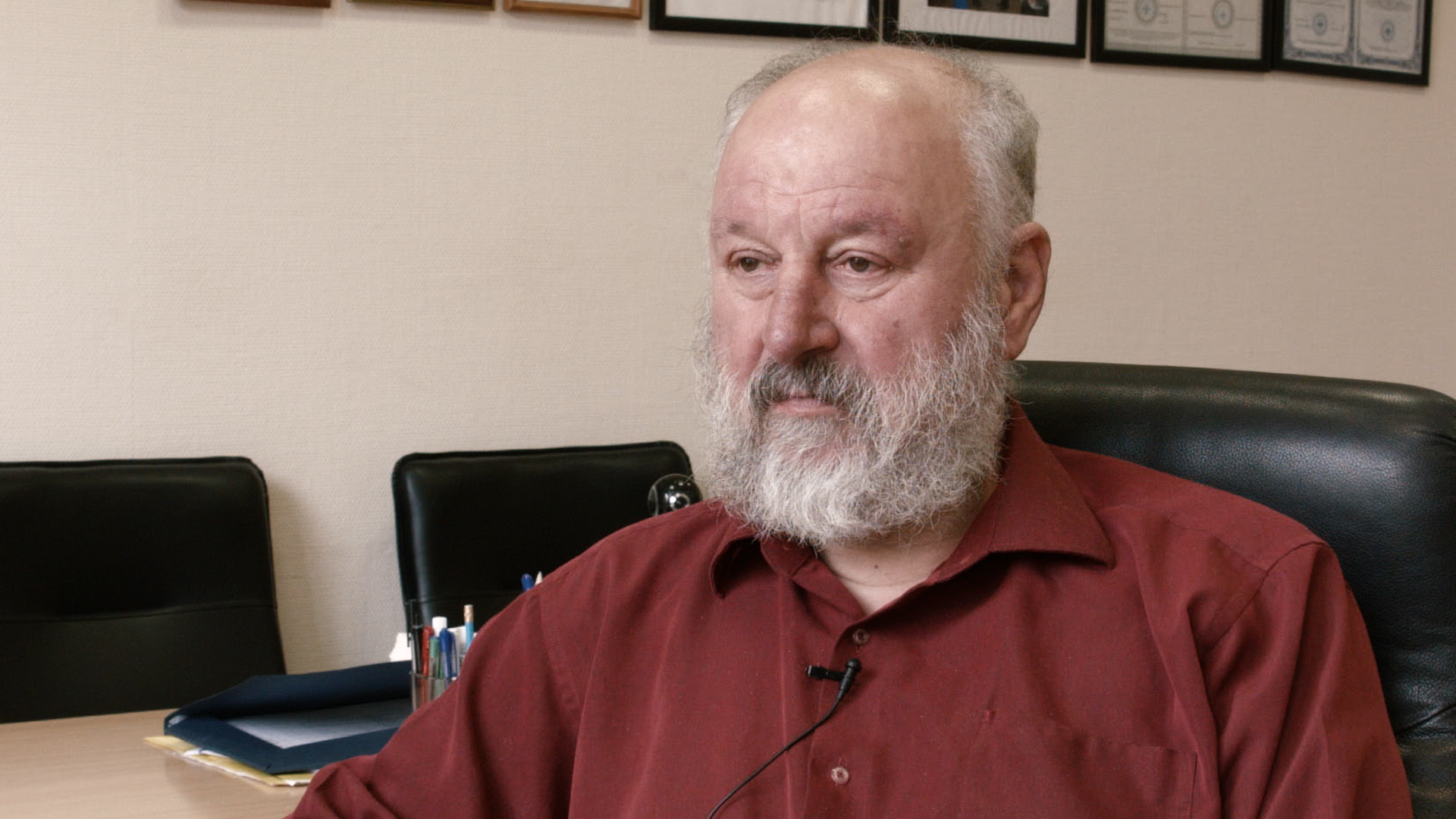
Head of the Department of System Programming of Matmekh, St. Petersburg State University, Professor, Doctor of Physics and Mathematics, President of Lanit-Terkom Andrey Terekhov, about how he did the first translator of languages Algol 68 and Ada in the USSR, about the power of the CPSU regional committee and the birth of Samson, which never did not break.
Start
- My father came under the famous Khrushchev reduction in 1960. A million two hundred thousand people were simultaneously dismissed from the army. At this time, he, a colonel engineer, was the deputy commander of the aviation corps in the Crimea for a special part of the aircraft - that was what airplane electronics was called then. But since he came from Leningrad, his mother and sister lived here, he got an apartment in three months. So in 1960, I ended up in Leningrad. Prior to this, he traveled a lot around the country, and was born in Azerbaijan.
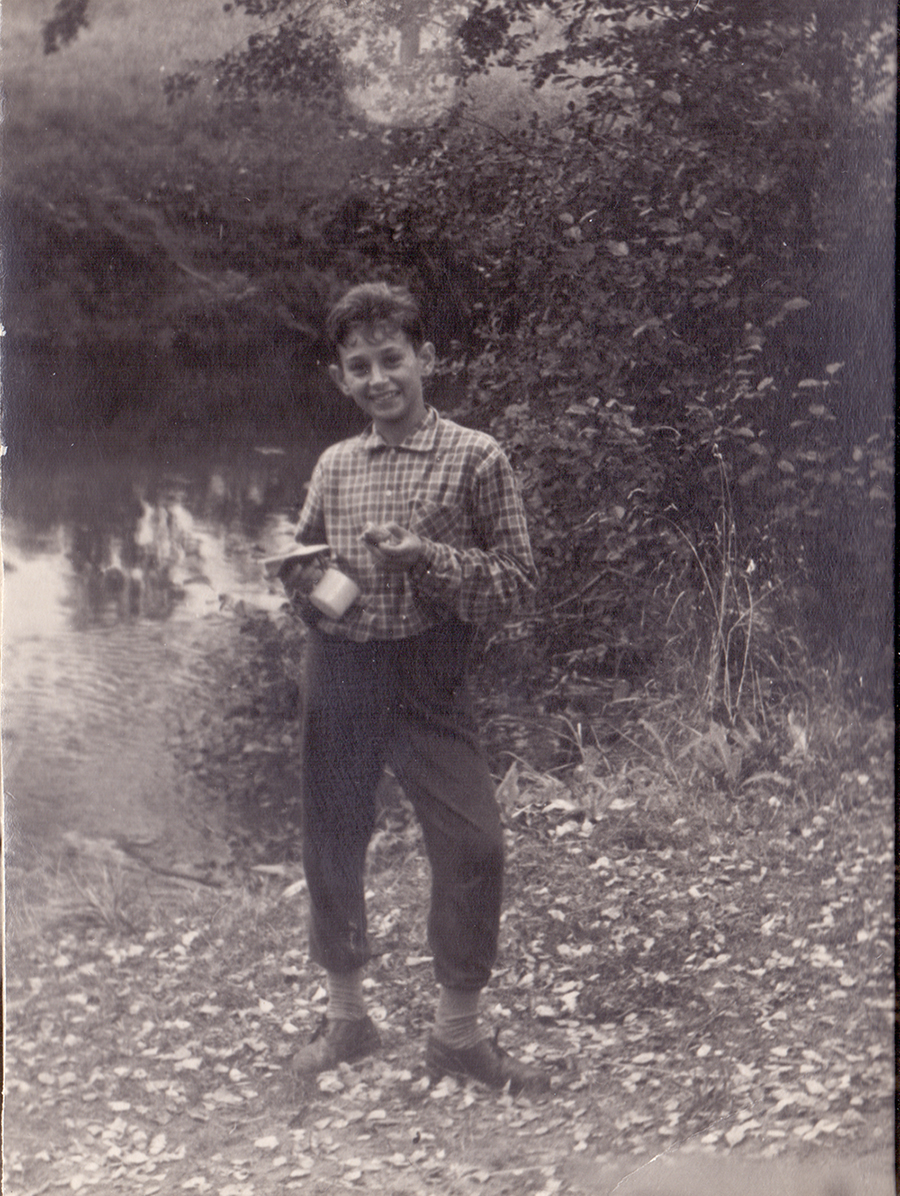
Andrey Terekhov, Carpathian region, 1960s
In school, I did not particularly stand out, but my teacher of mathematics advised after 8th grade to go to a mathematical school - the 157th. She now stands at Smolny, and then was simply famous. School of the Academy of Pedagogy, she even did not obey GORONO. And I traveled every day from the ring to the ring every day from the Nevsky district to Smolny and back.
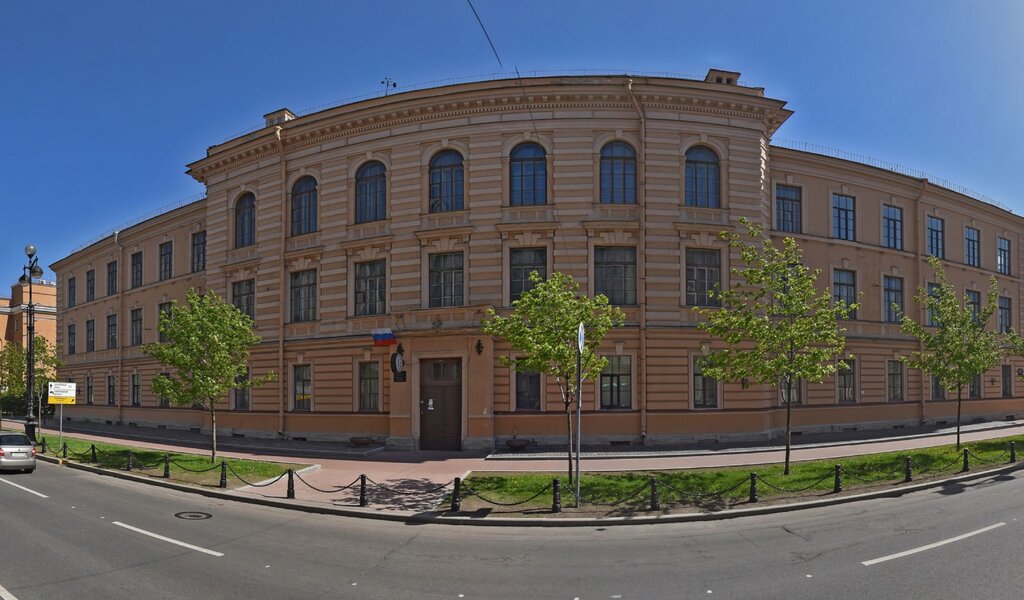
Gymnasium No. 157 since 1999 bears the name of Princess Eugenia of Oldenburg. From 1968 to 1973, the school was the official experimental site of the Academy of Sciences of the USSR
At school, we had two Ural -1 machines, and it turned out that by then I already knew how to program them. In the army, his father worked mainly on analogue technology, and on a civilian he encountered digital. At the age of 46, it was difficult for him to understand all the vicissitudes of digital logic. He bought a book by Kitov and Krinitsky (A. Kitov, N. A. Krinitsky, “Electronic Digital Machines and Programming”, Moscow, 1959 - Ed.), Put it in my nose and said: “Read! You will then interpret. ” I tried to buck, I got a slap in the back. Colonel Dad is a tough educator, but he drove me all right. When I tried to apply the same methods to my children, my wife, like a tigress, rushed: “Do not touch!” Therefore, my children program worse than me.
First grade
After graduating from grade 10, I got the first rank of the programmer, the smallest. In 1966, the 10th and 11th grades were simultaneously graduated. Eleventh graders were given third grade, which is much higher than my first. But I lifted my nose and failed the exam for Matmeh. I received 3 points for the composition - I spelled the word privilege incorrectly. The theme, based on Sholokhov’s novel, was called “Fighting the Enemies of Soviet Power” - somehow.
Entered the evening. I could not get a job for a long time, because there were few years, and programmers then worked mainly in secret companies. And yet I managed to get into Lenelectronmash. At first I was an errand boy, but literally a week later the head of the computer center Boris Zubarev saw my discharge. It turned out that I was the only graduate programming specialist there, all the rest were dummies. And they made me the head of the service programming group - that was what system programming was called then. My experience as a system programmer is more than half a century.
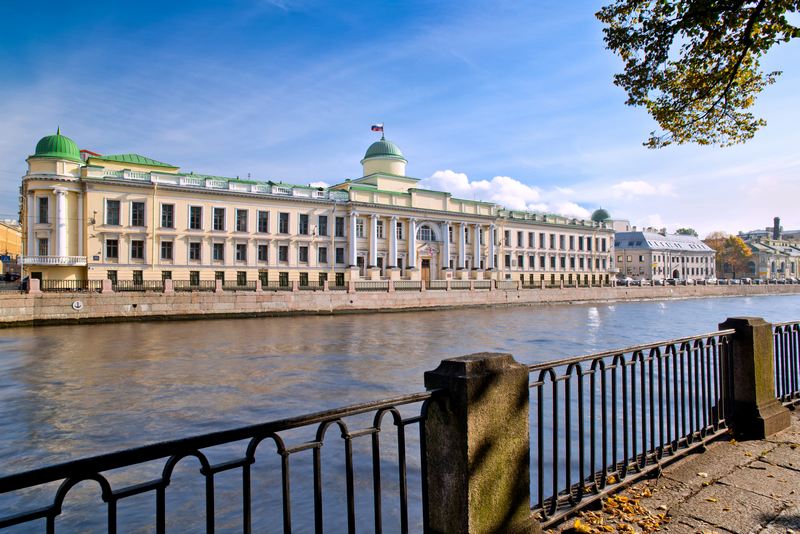
LTP “Lenelectronmash” was created in 1965 to centralize the development and implementation of management systems at Leningrad enterprises. Its main EC was located in the building of the former Imperial School of Law named after Prince Peter of Oldenburg
In Lenelectronmash there was a Minsk-22 car, and not even one. I worked for her, and led four subordinates who were 10 years older than me. At first he was embarrassed, then he was somehow used to it. It turned out that the team is even good. They didn’t sell cognac to me, but please - to them.
When I graduated from the first year with honors at the evening, I was automatically transferred to day time, without even asking. But at Lenelectronmash they left full-time, although this was a violation of the law. For five more years I worked as the head of the service programming group, even when Mathmech graduated.
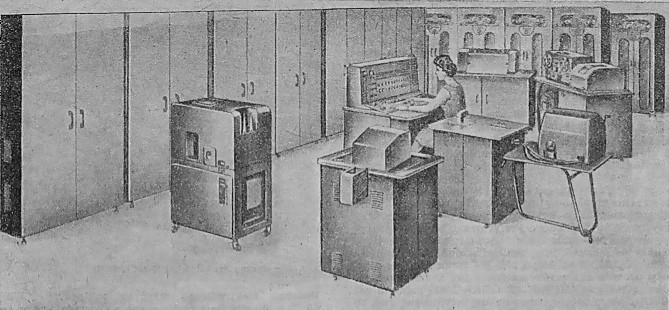
"Minsk" -22, illustration of 1965
A funny story happened on the distribution. It was quite tough in those years, you won’t do it - they could put you in jail. The state paid for the training, which means you had to work. I was offered to become the head of the department of the Statistics Department with a salary of 250 rubles. What was the amazement of the commission when I refused. “Where are you going?” They ask. “Rummage!” I answer. We rummaged and found a direction in the CC LSU with a salary of 105 rubles. It suited me. Chairman of the commission: “How? There are 250 rubles, and here 105! ”-“ It's okay. I don’t want to go there. ”
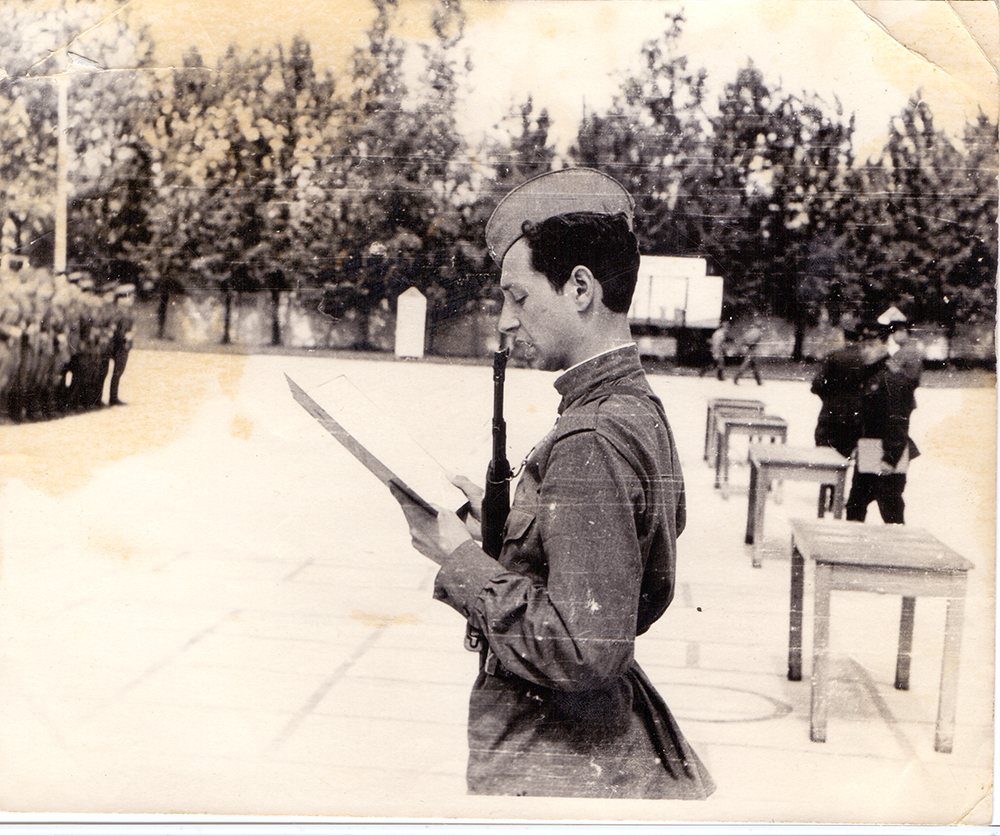
Andrei Terekhov takes a military oath. 1970 year
The fact is that in the Department of Statistics I hacked, I knew this work and didn’t want to count the cows, but still, science is at Leningrad State University. Moreover, here I also worked from the third year — in general, I programmed in six places.
University
My supervisor was the famous scientist Grigory Samuilovich Tseytin - one of the founders of the theory of complexity of algorithms. And so he brought to us in the group, which was then called the “System Programming Laboratory”, the idea to implement Algol 68. Honestly, he was the most difficult programming language in the world, he tried to scare us. But we were young, impudent. They began to do.
They worked for many years, the book was written “Algol 68: implementation methods” , more than half there is my text. When we started, we had a doctor of sciences, 5 candidates and 15 students with us. Then it turned out that we were making a translator for an EC computer, which had not yet been created. But there were two stolen eibiemihs - real, original - at the NICEVT in Moscow. The sale of modern technology in the USSR was strictly prohibited by American laws. But, as in one Jewish joke, "it was difficult, but they managed to."
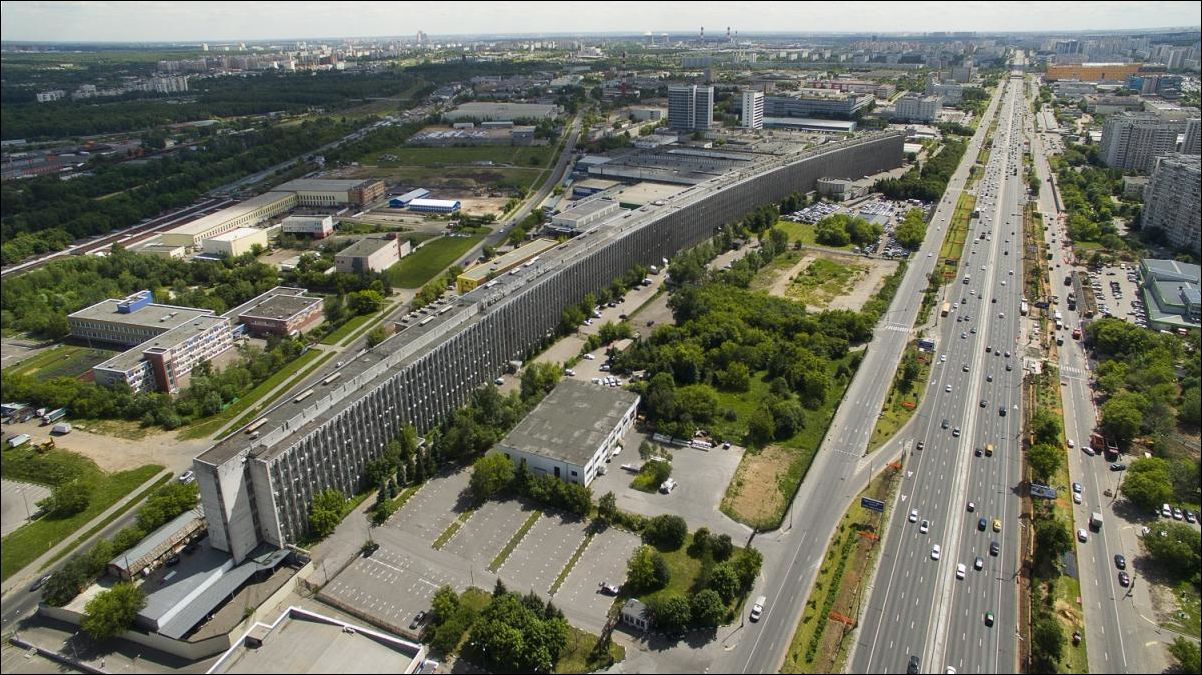
The NICEVT building on the Warsaw highway - the longest in Moscow - is known as the “recumbent skyscraper”
Two cars were bought, they stood on the Warsaw highway, and here we, the youth, went there. They gave us time at night, because only Muscovites work during the day, and all the rest at night. We lived in the NICEVT hotel, in which foreigners also stayed - Czechs, Hungarians, Germans. The maids were absolutely sure that we were bandits, because we were absent at night, and in the daytime we were sleeping and always the “do not disturb” sign. Then they met, somehow explained, but at first they looked at us with horror. What kind of people who go somewhere every night? On the other hand, we were inclined to work on the IBM 360, and when the EC computers appeared, they were already luminaries, everyone looked into our mouths.
Work at night has its advantages. Nobody is watching you. Here is the ADCU - the Soviet alphanumeric printing device, and the American one next door. Ours is breaking all the time, for some reason the American is not. We quietly fold the cable once - and work all night in good American, and in the morning we switch back. In the afternoon, no one would give us this. And so in everything - they got the hang of working. I still remember the command system, the operating system. I think today I can program on it. Because the mainframe has not changed much, that is, the Job Control Language, the command system, translators - I follow my students' coursework and find out everything in half a century.
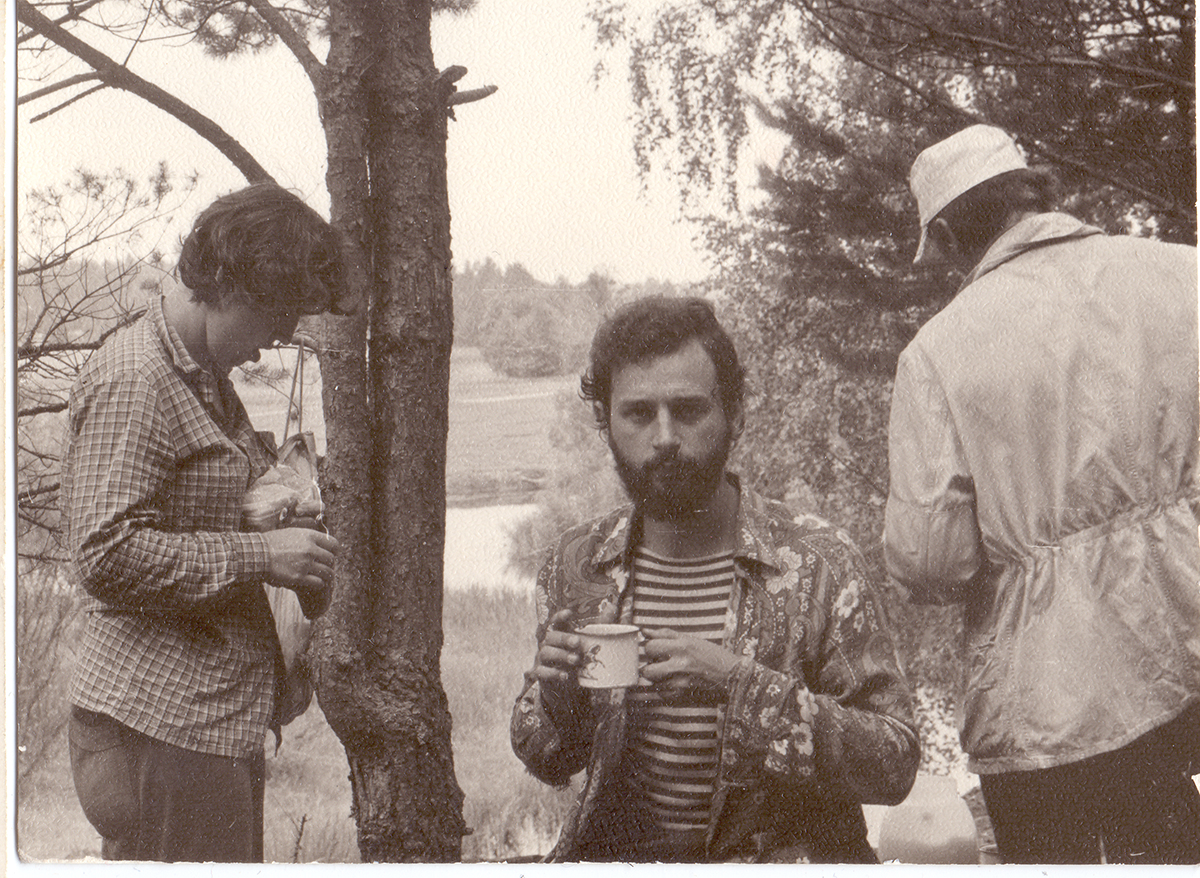
Andrei Terekhov on a campaign, 1975
In general, we made the first translator in the USSR with Algol 68. Then I came from Hungary, where I lectured for three months, and brought a description of the standard of the US Department of Defense - the language of Hell. And we made the first translator in the USSR from the language of Hell, too. Then they also studied the languages of artificial intelligence, but this is a different story.
Defense order
A turning point in my fate occurred at the end of 1980. The defense department of the regional party committee turned to the University for help in the development of digital computing. Not only my father could not understand how this works, although 20 years have already passed. They worked not just archaically, but somehow in the ancient way, completely on their knees. On toggle switches, in binary codes, on punch cards.
There was such a famous order "Caucasus" -1 - government long-distance communication. Then it was top secret, now published. It was done for 15 years, could not finish, and now they instructed us to help. They replaced the chief designer, a bunch of people worked. We achieved a technological breakthrough, and two years later with our help we delivered the order. True, for 17 years he is already hopelessly outdated.
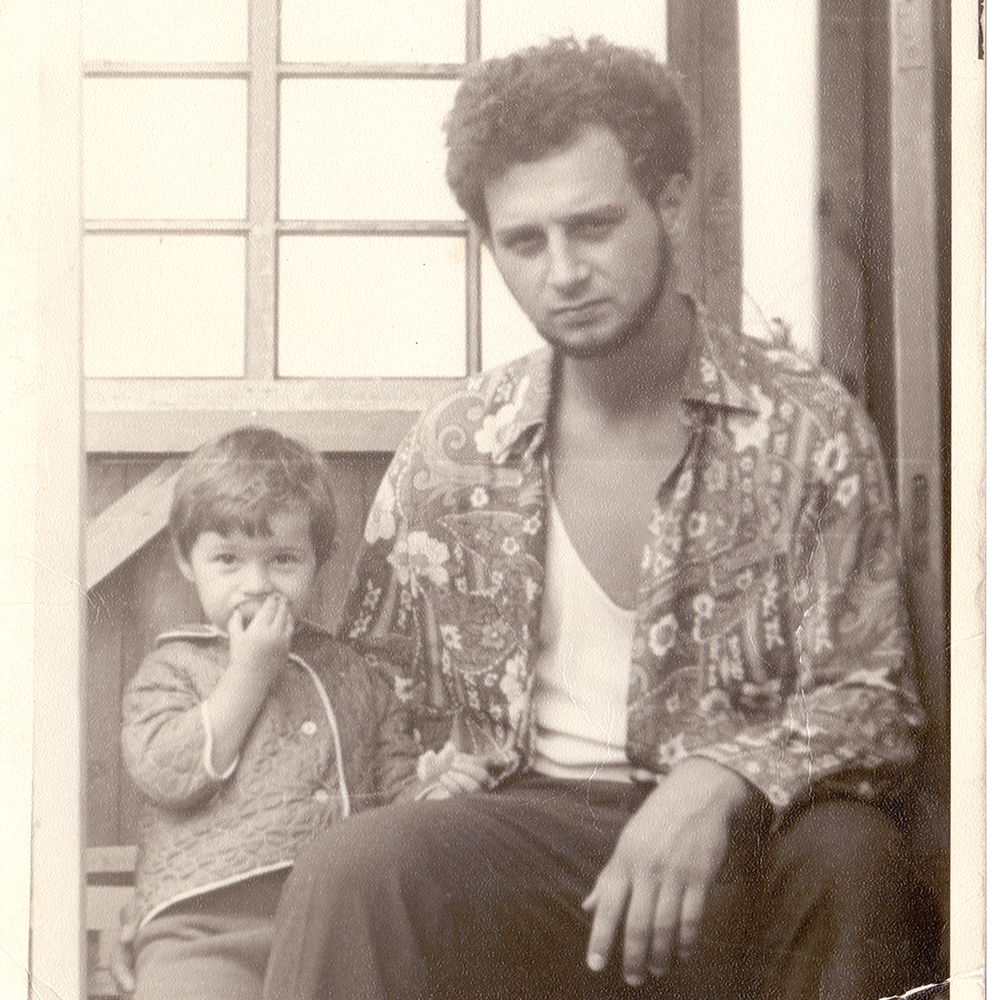
With son. Late 1970s - early 1980s
In general, I tried to preserve my virginity and not get into secret orders. As a university person, from time to time I traveled abroad, and if you work for the KGB agents, you will be quarantined and you will not see anything else. But I had to change my position. New tasks, new requirements, new resources. We received 27 million rubles at a dollar exchange rate of 60 kopecks, made the Zvezda technology and implemented it in the KGB.
It was needed in order for the documentation to be done on a machine medium, not on paper, in order to work in high-level languages, and not in assembly language, as all the military worked. What is a communication editor, they did not know. In general, a nightmare, scary to remember. I got 300 people under my control, they began to call us eggheads. They tried to beat me several times, but I have the first category in basketball and in general my shoulders are quite wide. Fought off.
Many years later, I told this story to my students and gave the names of people who particularly annoyed me. A girl stood up: "Andrey Nikolaevich, you are now talking about my mother." I was embarrassed: "I'm sorry." And a week later she comes: “Mom said hello to you. He believes that you were right, and they are all goats. ” Me: “Good,” but since then I haven’t given names.
Painful memories, and most disgusting, we worked on smelly war machines. UK1010, SUVK SS, SUVK SM. The Neva made in Kiev is the most disgusting. All of them withstood shaking, drying, surges. Good hardware, only for them it was impossible to program.
Here is the Neva, for example. For her, it’s impossible to program with her hands, but you’ll die completely. We made 15-20 cross-translators - it was an element of our technology to get away from these military vehicles. We work on an EC computer, then overload with a cross-translator into the code of another machine, go to it. This, too, was the great advancement we made.
We worked in Krasnaya Zarya, Leninets, Okeanpribor, Aurora - in all enterprises of the Nine (there were nine defense ministries in the Soviet Union). I was an instructor in the defense department of the regional party committee, I had an "all-terrain vehicle" - a pass to Smolny and to any defense enterprise without any information - you show and go. And in Leningrad there were such enterprises before the fig - our city was generally considered the capital of the defense industry. The head of the defense department could, for example, call an allied minister and report back. I have seen.
The regional committee of the party - it was a terrible force. Romanov, a member of the Politburo, launched the Intensification 90 program. Many times I heard his speeches that “there were two revolutions in Leningrad, but the third is technological.” By the way, a very reasonable man was, when Gorbachev threw him off, we were upset. This "Intensification 90" is a cool program, a lot of money was swelled into it and a lot of things were done. The last factory of the Soviet Union with machine tools with numerical control was created for the money “Intensification 90”, here not far - in Sosnovaya Polyana. I participated in equipping it. Now I am a true capitalist, I earn a lot of money, I receive dividends, but still I admit that the Communist Party was the driving force. Then they broke everything and did not make any substitute force.
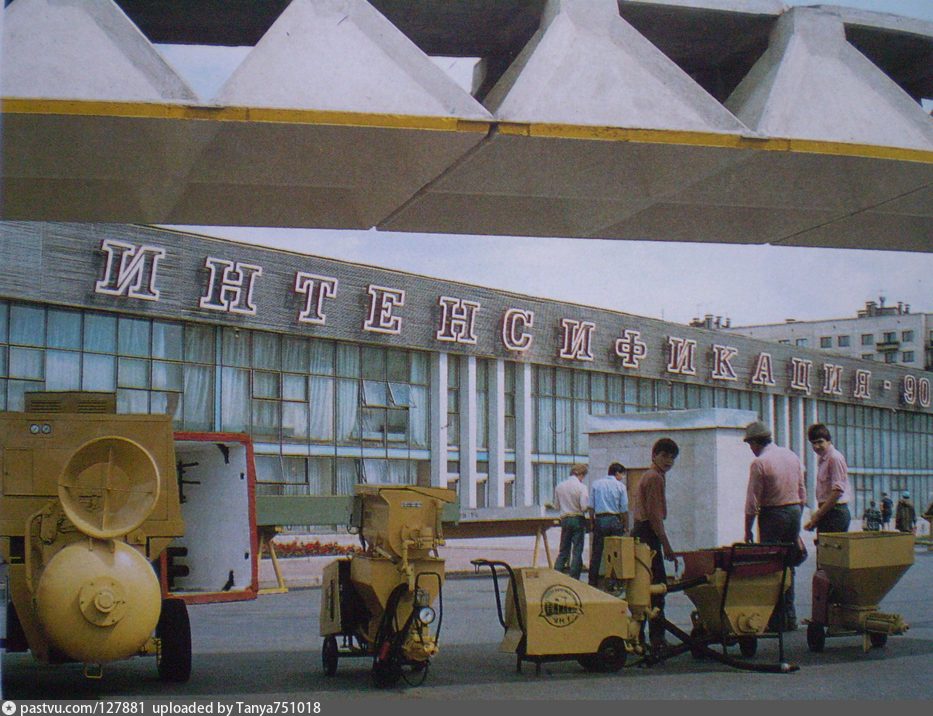
By the arrival of Mikhail Gorbachev in 1987, the still not open amusement hall in the Kalininsky district of Leningrad was turned into the Intensification 90 pavilion
In 1984, Moscow hosted the exhibition "Computers in the Soviet Army". I naturally came. More than 200 types of computers were presented there, not counting small splashes. And what is 200 computers? These are 200 operating systems, 200 sets of spare parts and accessories - spare parts and devices. In other words, squandering. In America, then there was one standard defense vehicle - Interdata 8/32. One! And one base language is Ada. And the rich Soviet Union has 200 cars, and try to object to someone. I spoke several times in the defense department of the CPSU Central Committee in Moscow: “Let's make one car.” “Andrey, do not go in,” they answered me politely, but firmly.
There was "Armor" - the base telephone exchange of the Soviet Army. It has three different cars. One for switching, another for managing the network, and a third for working with the operator. With different command systems, with different operating systems, three sets of officers need to be served. A thousand rooms are just a little station! Three computers - where does it fit? And when I tried to curse, they again told me: do not go in.
Elbrus
At that time there was already a Soviet Elbrus car. I have known her since 1974. Through friends I entered there - a secret machine, air defense of the country. It was declassified only in 1982. And she is not stolen - the original. I know all the people who developed it at ITMiVT - the Institute of Precision Mechanics and Computer Engineering.
I often went there, once even got into a fight in the corridor. I see - there are three guys of some sort and they say: “pipline, pipline” (pipeline). I should pass by, but I stopped: “Colleagues, we must not say pipline - this is generally a raunchy word, like a pip show in Hamburg. Pipeline, or better yet, water supply. This is your director, academician Lebedev. And invented and published in America. Pipeline is a translation from Russian into English, and not vice versa. There are not many American terms that are translated from Russian. ” They are at me with fists. Of course, I fought back, ran to Babayan: "Boris Artashesovich, here you people do not know who Lebedev is." And this is the Lebedev Institute. They decided to find the guys, but they were already gone.
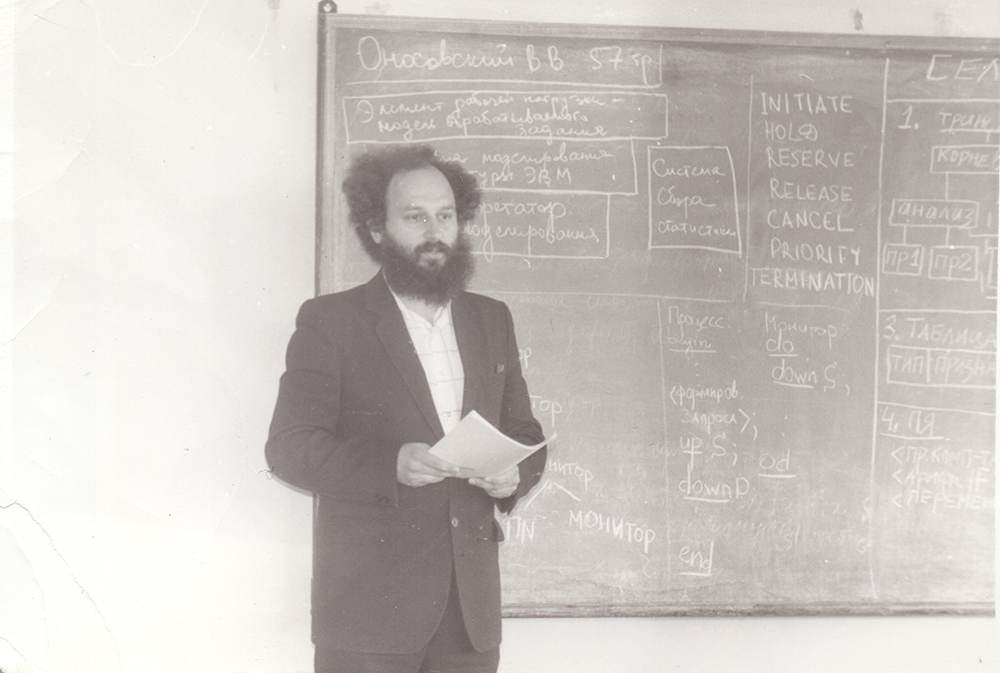
Andrei Terekhov gives a lecture at Matemekh LSU, 1980s.
Elbrus had a serious limitation. Although this machine was for air defense, and then for missile defense, it was possible to use only the Soviet element base. As you know, Soviet microcircuits are the largest microcircuits in the world, so Elbrus had all the boards double. One board is getinaks, where the microcircuit itself is, and under it there is a copper board for heat dissipation. She stuck into a pipe through which distilled water flowed - for cooling. But she warmed herself desperately. In other words, they tried to squeeze out from the Soviet element base what cannot be squeezed out. This was beyond the technological capabilities of the country.
We made a huge software package, the interpreter of the Elbrus autocode, on which we became very famous. The machine, as always, was delayed by 6 years with the release, and for many years all the programs for Elbrus were made on EU computers on our interpreter, throughout the Soviet Union.
Then it was impossible to pay with money - they could plant. But it was possible to get "greyhound puppies." Kolya Fominykh, my subordinate and student, will go to the main naval headquarters, give lectures to them, teach him how to use the autocode and bring a piece of paper to receive another EU computer. As a result, the system programming laboratory, which I had already commanded by that time, was richer than the computer center of the entire University.
They pointed a finger at me - a grabber! Complaints were written in the party committee, they say, I collect cream from Matmekh, the best students come to me. Yes, but I have the best laboratory in the faculty! “You lure these best students with equipment, displays,” they say to me on the debriefing. “I don’t have a millionaire dad. As I can, I lure. Compete! ”- I answer. The party committee secretary then asks: “What should I write?” I say: “An explanatory work has been carried out with Ph.D. Terekhov.” “Good,” they recorded and parted.
Laboratory head
"Elbrus" we were very fond of. Our head of the department, Lavrov, who once worked at the Korolev Institute and calculated the flight path of Gagarin, called the EU computer a “whole-finished” machine. She is stolen, and Elbrus is original. And all Matmekh, all laboratories for 3 million rubles (huge money!) Made application packages for this new bare machine. I led the process.
How did I become the head of the system programming laboratory? When at night I had to work on EU computers, all the senior comrades fled somewhere. No one wanted to go to Moscow, and so by 1971, I somehow suddenly became the head of the whole topic. Colleagues: “Are you sitting there?” But I didn’t sit anyone! When you need to write articles and books, everyone wants to, and when to go to Moscow to debug, they disappear. Debugging is hard work. A huge translator, a bunch of people - they need to be docked. Everyone has their own characters, their own writing style. And by the time the translator ended, it turned out that I had become cancer on the lack of fish. Boris Konstantinovich Martynenko went to the department - they didn’t pay 260 rubles there, but 420. He hoped that the director of the research institute, Georgy Petrovich Samosyuk, would leave him and the head of the laboratory too. But he said no - left so left. “And who will be the leader?” - “And there Terekhov is.” By that time, I had already gone to all meetings, had ensured that employees were paid bonuses. It turned out that they were provided, but the head was too lazy to write a rationale. Today I know people who will not hit finger to finger to get the extra 100 thousand. This is a property of human nature. Someone stirs and tries to earn something, while someone sits on the priest exactly and believes that it is necessary.
Plushnik
When in 1980 the defense department turned to the rector Aleskovsky, I already headed the laboratory. Tried to play: I do not want to work with the military. Aleskovsky: “Young man, you may not become an employee of the university.” I'm good". I thought it was good, that they set me up, and then I realized that working with the military was a huge success in my life. Because new tasks, new requirements, new material conditions. We began to live much better than before and were engaged in much more interesting affairs with significantly higher requirements. For us it was a kind of leap into the future, and after perestroika it helped me a lot. Military experience, team organization. It’s one thing when you have 15 university employees in the laboratory, everyone’s eyes are burning, you don’t need to push anyone. And here - 300 people, the most diverse and dirty ones including.
I failed the first KGB change. Because some bastard stole one punch card. She hoped that they would expel me - some subordinates did not like me much. Imagine: 300 people sitting on Karl Marx Avenue receive a salary, as in the north. They were paid more than me as a candidate of science. And here we come with our tasks. In general, the situation was unpleasant, and someone screwed up.
But they did not know that I was a plushman. I'm always lucky. Accepted the work of General Terekhov, Yuri Fedorovich. For the first half hour, he found out whether we were relatives or not (no). He is still alive and well, sometimes he sends me regards. Terekhov told where our name comes from. When serfdom was abolished in 1861, surnames began to be given to peasants by the names of their fathers. Ivan - Ivanov and so on. On behalf of Terenty, the surname Terentyev went across Russia and only in one Ryazan province - Terekhov. So all the Terekhovs come from there.
The general, of course, did not fire me, but said: "Andrey, put things in order." Prior to this, when I was offered to monitor people - who had been absent for many, smoked - I angrily rejected this.
He said that these were all spy things, and I was a university person. I thought that all the people around were decent, but it turned out that this was far from the case. And when the trouble happened, I remembered my father’s saying: "Not the fool who makes mistakes, but the one who repeats the mistakes." I made archives with controlled access, strong password protection. He rewrote all these decks of punch cards on tapes, and no one else could crawl in there to repeat his dirty tricks. I learned to fire. Before that, over the course of 20 years, he hadn’t fired a single person, but here - by entire departments.
Because we did a lot for Elbrus, we were given a fund to receive this car - there was no other way to get it. I was very proud because it is the most powerful car in the USSR. The room is a hall of 500 meters, the cooling tower is a concrete pond for storing water. Dug up, did everything. Then two of our engineers went to Moscow to the factory of calculating and analytical machines, where the Elbrus were made, and when they returned, they said: “We cannot accompany such a machine.” It turned out that some wild demands were made on the service. I don’t remember the exact numbers, but due to humidity, for example, if the air is slightly drier, sparks will slip through and the boards will burn out. If a little wetter, droplets will appear that will fall on the hot board, and it will also burn. That is, Elbrus can be exploited if you have a regiment of soldiers. In the conditions of Leningrad University this is unthinkable. I tried to yell, wave my fists. Imagine what an honor it is to be the only open organization in the USSR that has Elbrus! I earned it. But then, having figured it out, we all understood and refused to supply.
Per rectum ad astra
For me, this blow was scary, but useful. The understanding came that the salvation of drowning people is the work of the drowning people themselves. They decided to make a machine for themselves, mathematicians for mathematicians, for translators.
By this time there were already quite a few machines oriented to high-level languages, and we wanted just that. But the task is extremely difficult. For example, we were afraid that we would do another Elbrus with water cooling. What for? They tried to make a special guy, that is, only for switching. But they remembered the “Armor” with three computers and also decided to abandon this idea. In general, for a long time we could not decide on anything, even two people left me - my students, one might say, feeding up. They said: "Andrey, you are pulling us somewhere in the wrong direction." They wrote on paper in Latin per rectum ad astra , handed it to me and quit. Rephrased "through thorns to the stars" - "through w ... to the stars." Like, wrong I lead the team. The paper is preserved, from time to time I read it when it's hard.
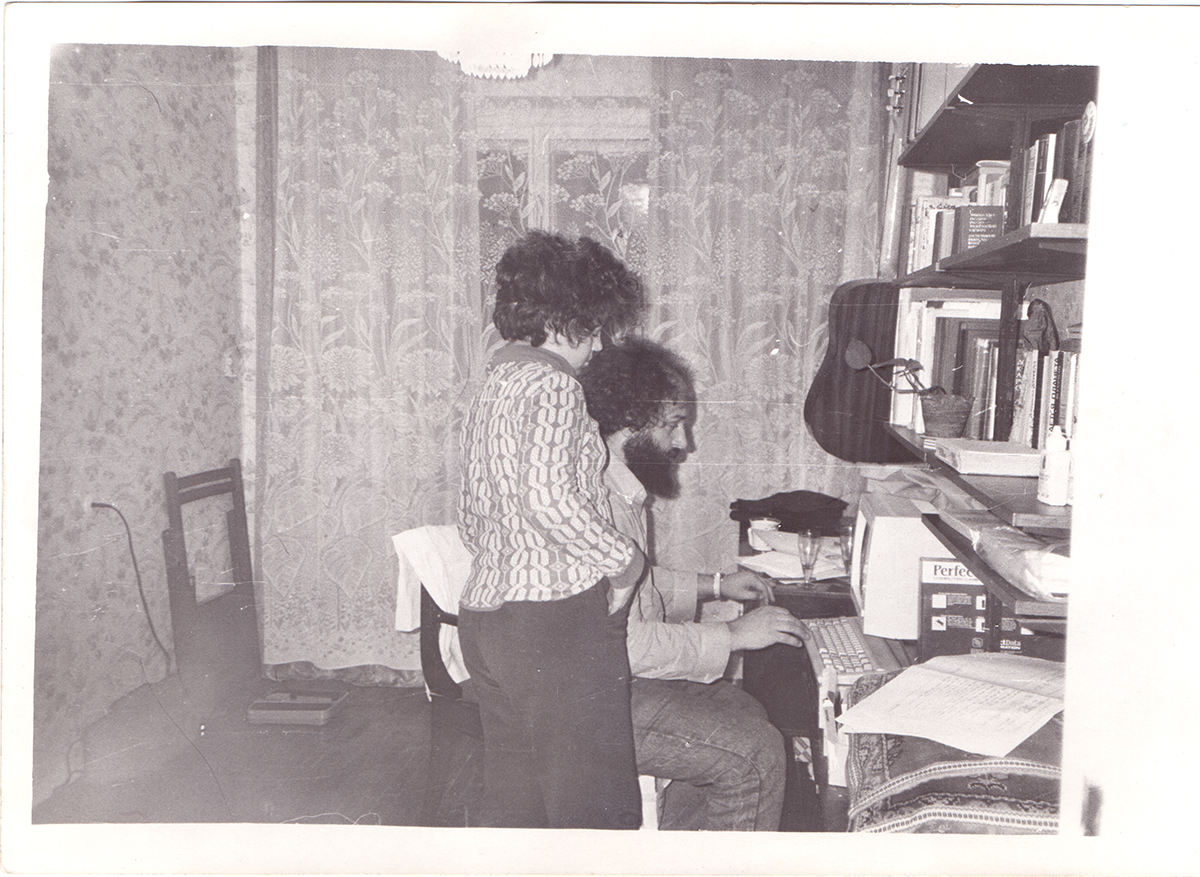
Andrey Terekhov transfers knowledge. 1986 year
Then, nevertheless, the idea came - I'm a plushman. We limited not the scope, but the scope of the input languages. There is a concept of static AYAVU - high-level algorithmic languages. Algol 68, Modula 2, Hell. There was such a programming language CHILL - the standard for CCITT (international advisory committee on telegraphy and telephony). And it turned out that if you restrict the input languages only in the field of static languages with full type control, you can take some of the functions to the translator. And then the equipment is simplified. Thus was born the "Samson" - our car, the original, with the original command system.
"Samson"
There was such a famous case. In St. Petersburg, they made a car with a flexible dynamic architecture. A bunch of "threshers", logical elements. We got the ES number, promised 10 million operations per second. On tests, she gave these 10 million, but on real programs - not. That is, like those of military vehicles: everything is fine, only programming is impossible. I was an opponent at the doctoral level with one of the authors, I wanted to insert a hairpin, and then I thought: people tried, worked. But only engineers can first solder, and then think about how to use it. Mathematicians don't do that.
I'll tell you my favorite joke. Lecturer on the farm lecture on the construction of communism. Grandmother asks: “And who invented communism - scientists, or communists?” - “Communists”. “So I think so. Scientists would try on dogs first. ” So, this joke is about the history of computer technology. Engineers immediately solder, and mathematicians first make a model.
"Samson" in the form of a mathematical model lasted two years. It was written by my daughter Karina, a first-year student, the future doctor of Oxford. By that time there was already a KGB order - they wanted a Samson machine, which was not there yet, to put the Phobos-K station to replace the Caucasus-1 - government intercity. In one order we made both a car and a station. Once a quarter, three KGB secretaries came to take the stage. And then another visit, I say: "My student will hand over this topic to you." And left. Two hours later I’m coming back - 16-year-old Karina with red spots on her cheeks argues with them: “How can it not be machines with zero state!” They: “Yes, calm down, girl, calm down!”
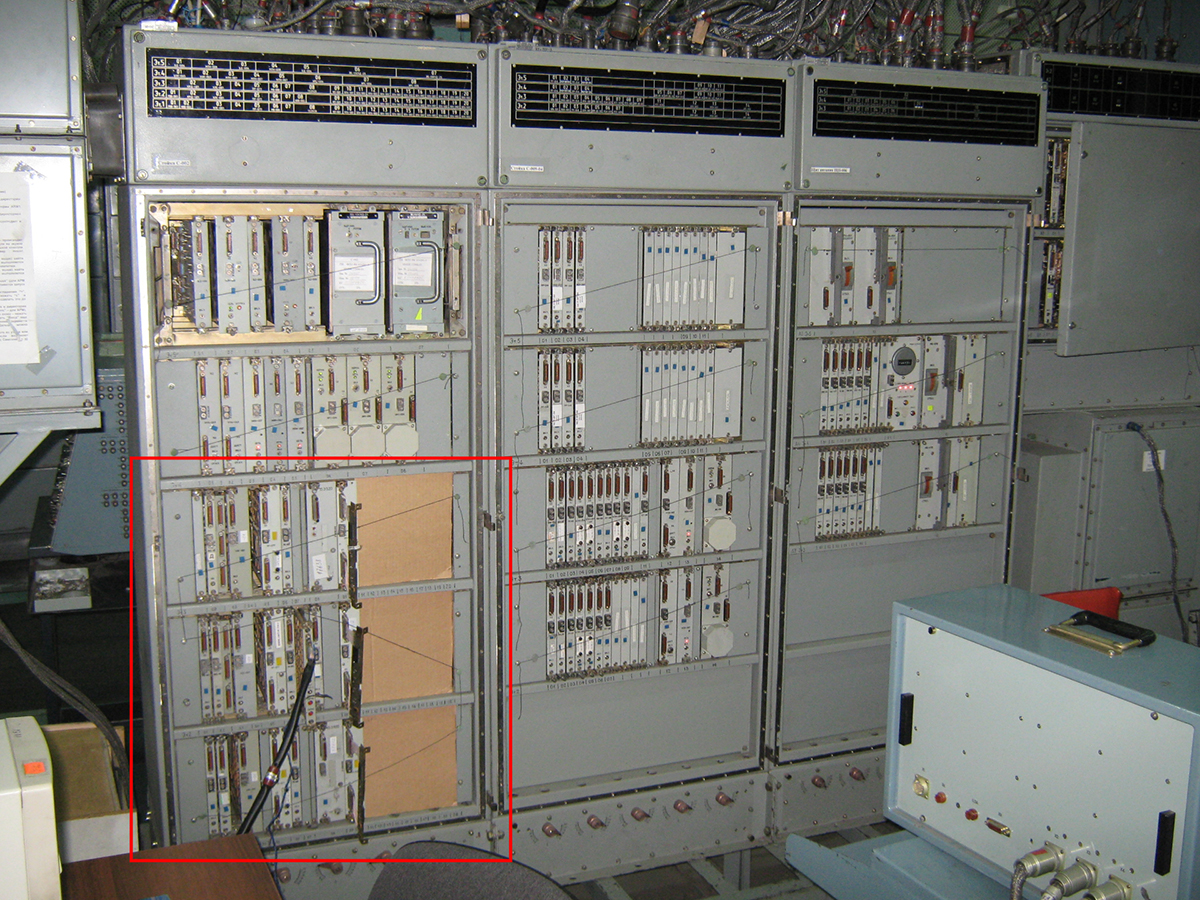
UVK "Samson". Basic computer of the strategic missile forces of the Russian Federation
With military customers, if you don’t drink, they won’t sign anything. We have a drink. “So this is my daughter!” I say. They: “And what didn’t you say right away?” - “Then the experiment would not be clean. Handed over? I handed over. Have you signed up? Signed up. Now I can say. "
Every evening, Karina and I did this: she drove tests on the interpreter, then gave me a printout of the frequency of use of the commands. We were only interested in those that are often used. We introduced new teams, glued them together. , , , .
, . RISC- , . , ? « » — 1 . — 2 . 4 . ? , . , 32 : « ». : «, . , ». . — 3 . , : «, ». , : 1, 2, 4 . .
«», , , , . : « ?» — «, ». — « ». . — , . . , - . 27 , — . — . - , IBM, «». , . 100 70- , — . 17 . , - - — , …
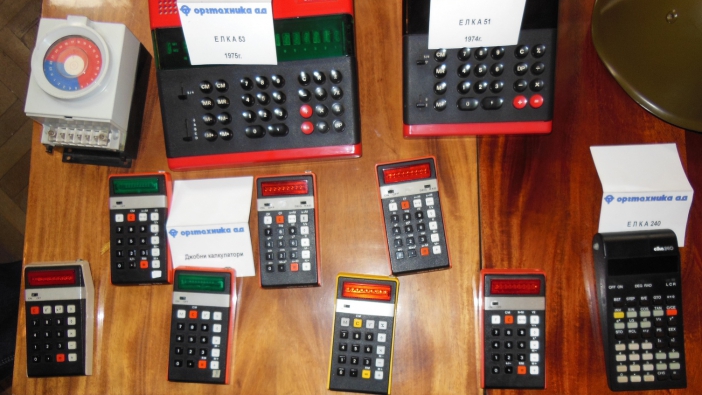
«» , , Elka, 1960- .
5 1987 — 70- . . , «» . . , — .
. . - . , , . - , , . — . : , . , . : « ! , ? ?»
«» , , 1992 ( — . .). , «». . , . : « — ». «, — . — ».
, — . . , , , . - , . . . 20 «» . — , , . , , , , . , . , : .
To be continued.
All Articles